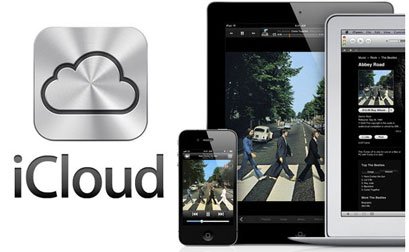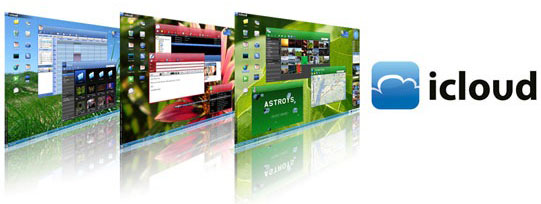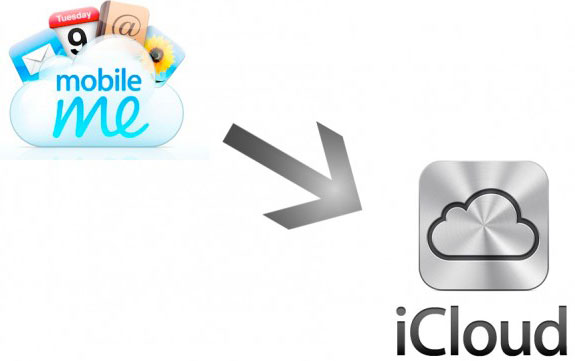ICloud handbook
Welcoming Apple's iCloud officially launched this fall, let's learn about the content and basic usage of this service.

What is iCloud?
iCloud is a free cloud service package that works on applications of iPhone, iPad, iPod Touch, Mac computer or Windows computer with the task of automatically and wirelessly storing data to iCloud or downloading all user device When there are any changes on one of their devices, all other devices will be updated almost immediately.
Is iCloud the same as MobileMe?
iCloud is not exactly like MobileMe. iCloud will provide some functions like MobileMe, but there are also new features.
What features does iCloud have?
Like MobileMe, iCloud can synchronize Safari address books, calendars, emails and bookmarks between iOS devices and computers. But iCloud also provides document storage, photo storage and music library synchronization, along with backup (backup) functionality for iOS devices.
Will iCloud backup all files?
Not completely. Apple says iCloud only syncs documents created by Apple apps (like Pages, Numbers and Keynote) as well as a third-party app adjusted to work with iCloud. Most iOS and Mac developers will probably join the iCloud movement, but in the transition phase there will be some apps synced with iCloud and some will not. Users need to be careful not to assume that all files are automatically stored with iCloud.
Storage capacity on iCloud?
5GB. Including mail, document and backup. Data such as music, applications and purchase books from Apple and Photo Stream images can be stored on iCloud without including the 5 GB free available.
What if I want to store more?
It is possible that Apple will allow users to pay to increase storage. In iOS 5 beta, in iCloud settings there is a "Buy More Storage " button (buy more storage). This makes sense, because many users can easily use 5GB. Dropbox file storage and cloud storage services offer 2GB for free and charge 10 USD / month for 50 GB or 20 USD / month for 100 GB. Apple may provide additional storage for the same price.
What is iCloud different from Dropbox and SugarSync?
Unlike Dropbox and SugarSync designed to allow syncing all files and ink messages on a computer, iCloud only focuses on integration with applications. So it doesn't matter where you store Pages documents on your Mac computer; Documents will be synchronized with iCloud because iCloud integrates Pages applications. In other words, you will not be able to - at least according to current information - use iCloud to synchronize documents of applications that do not support iCloud.
What about pictures?
iCloud has the Photo Stream function to automatically import new photos on iOS devices or add to iPhoto and store for 30 days in the cloud. You can view them (in some cases download them) on iOS devices, computers and even Apple TV. The synchronization is limited to 1000 photos on iOS devices, but not limited to computers (although obviously you can't run iPhoto on Windows computers, Apple says Photo Stream will also run on computers. This - you will simply select a hard drive folder that you want to set as a photo library (photo library)

Only 1000 photos? What about older photos?
iCloud stores and synchronizes 1000 latest photos. But that doesn't mean you will lose older photos. Apple says all photos in iPhoto (or another folder on a Windows computer) will be permanently stored on your computer.
What music features does iCloud have?
iTunes in the cloud allows downloading all songs purchased from the iTunes Store, as well as automatically downloading newly purchased music to all iOS-enabled computers or devices that your iTunes account. If you purchase songs from iTunes with the old AAC format (128-kbps) and reload them, those songs will remain in the same format when they are downloaded - there will be no 256 –kbps AAC format (which you pay Money to upgrade via iTunes). If the singers you buy are no longer in the iTunes Store, you cannot download them again.
Currently, iCloud does not support streaming music, which means that to listen to songs or albums, you will have to download songs or albums to your device or computer. Especially for iOS devices, this storage is limited.
What about songs not in the iTunes Store?
At a cost of 25 USD / year, Apple's iTunes Match function can scan iTunes library and find out (if any) the songs you already have without buying from iTunes coincides with the song at Apple Store - and then you You can access songs from any iOS computer and device, as well as for songs you buy via iTunes. This is in contrast to Amazon and Google 's cloud music service, which requires you to upload music to be accessible (although these services allow you to download music directly (stream) instead of downloading as Apple service).
Moreover, if iTunes finds those songs, it will replace low-bit versions with DRM-free AAC versions at 256-kbps. For songs that iTunes doesn't offer (Apple says they offer 19 million songs) you can upload from your files. It is unclear what will happen if you stop paying annual subscription fees, but if you like other subscriber music services, it is possible that some of your iCloud experience will stop working.
Stop iTunes Match subscription, have lost music downloaded from iTunes?
There is currently no clear information. But when the subscription expires, you cannot access these songs on iCloud, so you will not be able to download the device. However, it may be optimistic to hope that the songs will remain intact and playable, but will be separated from the cloud.
Play music directly from iCloud or download to your device?
You can listen to the song you want to buy before downloading (when browsing the album) but you can't listen to the entire song.
iCloud runs on all iOS and Mac devices?
To use iCloud, you need to use iOS 5 running on iPhone 3GS, iPhone 4, iPod touch 4th and 3rd generation, first iPad and iPad 2. On Mac, you need to run Lion and iTunes 10.3 or newer. . For personal computers, you need to use Windows Vista or Windows 7.
Transfer MobileMe account to iCloud account?
You can transfer your MobileMe account to an iCloud account when new products are sold. In Apple's MobileMe conversion document, it said ' when iCloud is running this fall, we will provide more information and instructions for implementation.'

Is the email address still @ me.com?
According to Apple's announcement via email, when you sign up for iCloud, you can keep your MobileMe email address. In addition, a valid iCloud user will have a free email address with a @ me.com extension.
What about other MobileMe functions like Galleries, iDisk, Backup, Back To My Mac, and Find My iPhone?
When Apple talked about the future of MobileMe and iCloud, it did not mention these functions. As mentioned above, iCloud provides 5GB of storage (not including processing data with most of the functions we described), but still less than 20GB that MobileMe currently offers.
For the Find My iPhone function, earlier this year Apple provided the Find My iPhone free for new iOS device users, which suggests that this functionality is still worthwhile for Apple, and we can hope that The company will continue to maintain Find My iPhone.